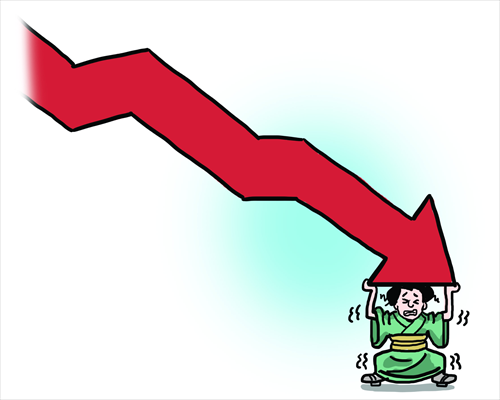Abe’s plans to boost women’s economic role underestimate housewives

Illustration: Liu Rui/GT
Japanese Prime Minister Shinzo Abe recently put forward a spectrum of new economic policies, as the "third arrow" of Abenomics, and one of them is to give full play to the role of women in order to boost Japan's sluggish economy.
It is reported that, influenced by a report of the IMF in 2012, the Abe administration has begun to promote this policy and take a series of relevant measures to boost the role of women.
For example, he plans to launch a "Davos meeting for women" and even to formulate laws to demand local governments and corporations to set goals to promote female leaders.
Indeed, in a typical Japanese family, the husband is the breadwinner, whereas the wife is busy doing household chores and looking after children. Full-time housewives appear to be idle labor resources.
According to the estimate of the IMF, if the participation of Japanese women in the labor force rose to the level of Northern Europe, the country's GDP per capita would be approximately five percent higher. This is a tempting figure for a Japan currently mired in a stagnant economy.
Nevertheless, it is too hasty for the Japanese government to make the decision to increase female workforce participation just because of the estimate.
The professional housewives are not a potential treasure but part of the present-day Japanese social system. They have their own social functions, which if altered will bring changes to myriad aspects of society.
Japanese housewives are not living a daily life of ease and leisure. Many of them have part-time jobs near the home to help afford family expenses. They tend to take on boring and low-income jobs in supermarkets, convenience stores or restaurants or simple work in some firms instead of in full-time employment.
Without these housewives, there would be a gap in the labor force for such trivial but indispensable work.
Though most of the work done by housewives is not accounted in GDP, it has substantial value. Their husbands can hardly care for housework because of the fast pace of life, so housewives have to care for all the trivial family chores.
And owing to the highly insufficient provision of nurseries and kindergartens, housewives must spend a lot of time looking after their children.
Besides, they also care for the elderly, purchasing daily necessities, and sometimes serve as volunteers.
The Japanese cabinet has calculated that the work done by the housewives amounts to an annual output value of 110 trillion yen ($1.07 trillion), accounting for almost one quarter of the aggregate GDP of the country.
If all the housewives in Japan go out to work, the government must lay out expenses to hire other people to take over what they are doing.
Therefore, most of or even all the income earned by the housewives has to be allocated to employ laborers to replace them, which will result in an increase in GDP, but not in total social wealth.
There will be more problems if more housewives seek professional careers. It is because wives manage all the household chores that husbands have the time and energy to take over high-intensity jobs. But if both go out to work they may have to share housework, denting the average work efficiency.
In addition, if wives have no professions and their income acquired through part-time jobs do not reach a certain cap, they are exempted from social security fees such as pension and medical insurance, and their husbands can enjoy preferential tax policies. But if the housewives take up full time work, Japan will adopt large-scale adjustments in its social welfare policy.
It is fair to say that boosting the number of women in the workforce will trigger a domino effect. It seems that Abe and his think tankers have ignored a lethal consequence of their new economic policy, namely, the worsening of the population crisis.
With a shrinking birth rate, Japan is now suffering from a sharply aging population. Meanwhile, the fertility rate of professional women is obviously much lower than that of housewives. So what measures will Abe take to complement the labor shortage in the future if he sends the housewives into the workplace?
The author is a lecturer at the School of History, Wuhan University. opinion@globaltimes.com.cn